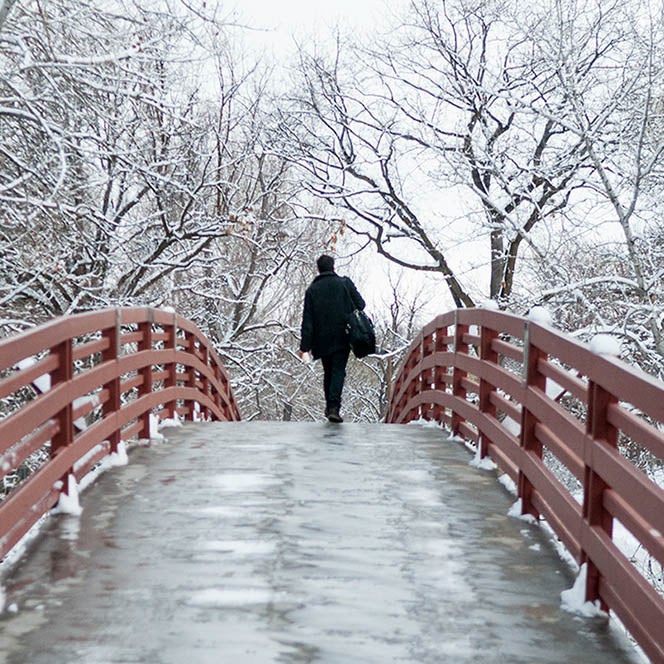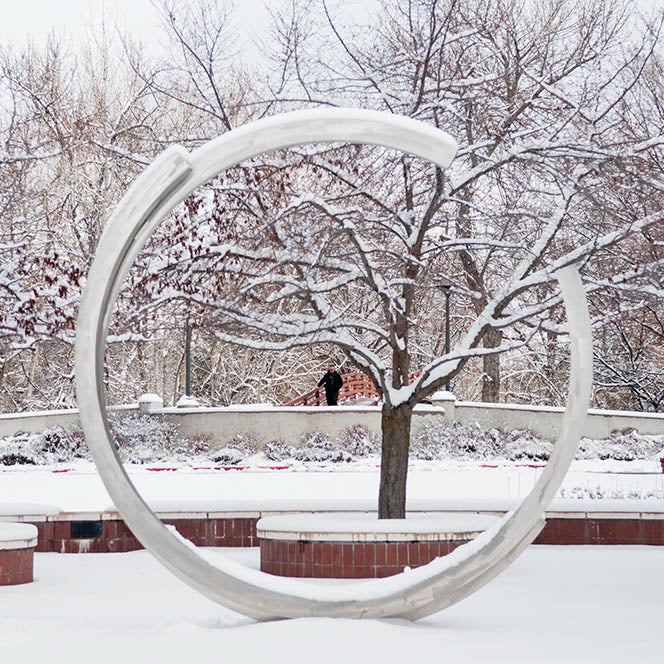
Finding peace on Earth in solitude
The holiday season is supposed to be a time of joy and connection. Images of family gatherings, laughter and celebration fill advertisements and social media while nostalgia, for some, hits a sweet spot they try to recreate every year.
But for many, the holidays intensify feelings of loneliness, making it difficult to find peace and warmth amid the festive season. In fact, a recent survey revealed that 61% of Americans experience sadness or loneliness during this time, and 37% would skip the holidays altogether if given a choice. Sometimes, people prefer solitude to the alternatives.
People can experience loneliness based on a number of factors. The social expectation to be happy can make individuals feel isolated, especially if their reality doesn’t fit these cheerful portrayals. Family tensions, loss of loved ones, or being far away from family, which is common for students and faculty, can deepen feelings of isolation. Additionally, seasonal affective disorder affects millions each winter, adding another layer of mental health struggles to an already challenging season, and some experience loneliness while surrounded by loved ones too.
Reframing loneliness
According to Distinguished Professor of Psychology Professor Eric Landrum, how one perceives control over loneliness can change its outcome.
“Loneliness can lean toward it not being your choice–feeling out of control as opposed to chosen solitude,” he said. “I can choose to be alone, read a book by myself, or watch TV. But when I’m alone, and it’s not by choice, that’s when it becomes isolating, when you feel like you’re part of the out-group and not the in-group.”
The Surgeon General’s 2023 Advisory on the loneliness epidemic states that social connection is a fundamental human need, as essential to survival as food, water and shelter, and missing this connection can lead to premature deaths by up to 29% based on the odds ratio of living alone and feeling lonely.
But with the holidays approaching, let’s face it, some are gearing up for one of the most difficult times of the year. They prepare themselves to answer innocent but semi-invasive questions from well-intentioned friends or colleagues, such as: What will you be doing over the holidays? Who will you be spending time with? And sometimes the answers to these questions feel lousy, especially when they are immediately succeeded by on-the-spot follow-ups and an awkward response:
“Oh, you’re going to be alone, huh? That’s too bad. Don’t you have family you can see? Or close friends?”
“No. There isn’t anyone. Not really.”

It’s important to remember that being alone during the holidays doesn’t have to mean one is lonely. Reframing loneliness can act as an opportunity to cultivate solitude, a time for self-reflection, creativity or even empathy. Research has shown that moments of solitude, when embraced, can lead to positive personal growth, making it okay, even empowering, to spend this time alone. On the flip side, social media can offer the illusion of connectedness, but it can increase feelings of isolation, Landrum explained.
“You think you’re more connected because you go on Facebook and have a thousand friends. But how many do you really talk to? The perception of friendships and connectedness is often false,” he said. “Platforms like TikTok or Instagram aren’t substitutes for human interaction, even though they feel like they are.”
Resources are available
So what can one do to turn a Winter Warlock kind of despair into a positive Winter outlook? Well, as this holiday children’s song teaches, they can “Put One Foot in Front of the Other” and take action:
- Create their own new holiday traditions, something that feels right for themselves.
- Volunteer; helping others is a surefire way to warm one’s spirit.
- Learn something new: Take an online sketching class or free YouTube guitar lessons.
- Taking action can help to reframe anxiety and despair. Start the project that’s been nibbling at the back of the mind for ages.
- Seek out counseling or other mental health services.
And finally, it’s a good idea to follow your gut.
“If your gut tells you that you need some hangout time, try to make it happen,” Landrum said. “If you can’t meet face-to-face, make a meaningful connection over Zoom or FaceTime. The data are clear: meaningful human connections, even virtual ones, are invaluable.”
Boise State offers resources that can help. For faculty and staff, Boise State Health Services is changing to off-campus mental health services. On campus, they’re here to help consult and find local services that work with Boise State insurance, and they’re available to anyone for emergencies.
Boise State Health Services has several opportunities for students who are particularly struggling with mental health and loneliness. Matt Niece, executive director of University Health Services, said Idaho often ranks in the top five in the nation for suicide rates per capita, and young people, in particular, have difficulty with the stigma of isolation and loneliness. To understand and help the student experience, he recommends a book that defines the struggles of their generation: “The Anxious Generation: How the Great Rewiring of Childhood Is Causing an Epidemic of Mental Illness.”
Landrum echoed this advice.
“Younger people feeling isolated or lonely need to reach out if they’re comfortable, but that’s really hard for someone suffering or for painfully shy introverts,” he said. “If it were easy, they’d already be doing it. Breaking that stigma around seeking help is crucial.”

As the holidays approach, it’s important to remember that many people experience complex feelings about the season, however their traditions play out around them. Many quietly experience loneliness, grief, and the pressure to feel joyful. It’s normal to feel this way, and there is no single way to spend the holidays–it’s okay if traditions look different this year.
The season can invite reflection: How can kindness be extended to oneself and others at this time? Moments of self-compassion or gestures of care toward others can create warmth, even in unexpected ways.
-Written and researched by Jenny K Gilman